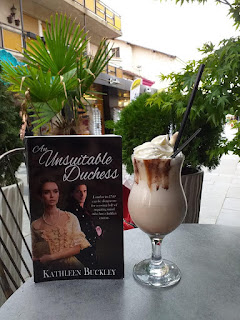I have always loved old things: antiques, traditional ways
of doing things, old photographs, stories about earlier times. This is probably
why I write historical fiction/historical romance.
A while ago as I poured water into my Mr. Coffee®, it
occurred to me that I’ve been using the same coffee maker almost every day for thirteen
years. Now I’m wondering what its life expectancy is (for purposes of
comparison, the dishwasher, refrigerator, and the washer, all new in 2008, had
to be replaced in the last two years). The gas stove, bought at the same
time, has
no oven light and no clock because it’s strictly gas, with no electric bells
and whistles, is still going strong. I did have to have a repair guy come in to
clean the soot out of the bottom of the oven when the holes got plugged and the
oven stopped heating*. My Kitchenaid Junior stand mixer, now about forty years
old, still works. By comparison, I’ve been through three (three!) printers in
thirteen years.
That led to contemplation of things that last.
Years ago, I bought a Hoosier kitchen cabinet. For the
benefit of those who aren’t familiar with the term, it’s like this early 20th
century advertising
illustration. There were many different styles (mine is
narrower and taller). My current house, like the last one, does not have a lot
of built-in cabinets, so my Hoosier is a godsend. It houses my crockpot, some
small kitchen equipment, dried fruit, spices and seasonings (including the
weird medieval and 18
th century ones like musk, and the chiles and
chile powders because this is New Mexico, after all), and it also serves as the
liquor cabinet. I believe it’s over a century old. It will outlast me, and
that’s an oddly comforting thought.
Maybe that’s why shabby chic furnishings, antiques and
genealogy are popular: they spell stability. And I think the appeal of historical
romance novels lies in the desire for things that last: a long line of ancestors and a house inhabited
by the same family for decades or centuries, heirlooms, enduring love.
But even if we don’t trace our ancestry back more than a
generation and aren’t rooted in the same soil that nurtured our
great-great-great-grandparents, we are still part of the continuity of
centuries. I have my father’s heavy bone structure, my mother’s singing voice,
my father’s aptitude for special relationships (you know, that thing about what
direction gears are turning? Didn’t get that from Mum), and my mother’s skill
with the language. My father and I both inherited his mother’s chin. I don’t
know where my nose came from. No one in any of the family pictures has it.
Maybe one of my great-greats in Somerset, England, Ireland, Sweden or parts
unknown contributed it. Our roots go back a long, long way.
 |
Arundel Castle, home of the Dukes of Norfolk |
*The owner’s manual blithely assumes the owner will do this
at intervals. To do so, it’s necessary to remove the oven door, either have
long arms or crawl into the oven, remove some weird-shaped screws at the very
back, lift out the steel plate that forms the bottom of the oven, clean the gas
apertures, replace the plate, re-light the oven pilot, and replace the door. No
doubt some people can do it. I can’t. I’ll happily pay a gas stove repair
person to come out every five years or so rather than buy a new, complicated
range that would have a life expectancy of twelve or thirteen years.


















